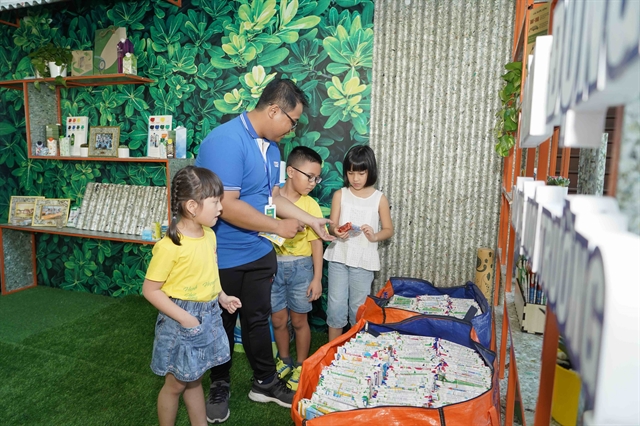 Environment
Environment

More than 1,400 kindergartens and primary schools have participated in a programme on classifying, segregating and recycling used cartons in Hà Nội and HCM City, after Vietnamese students returned to school following the COVID-19 social distancing period.

|
| Used cartons can be recycled materials for notebooks and bio-roof panels. — Photo Tetra Pak |
HCM CITY — More than 1,400 kindergartens and primary schools have participated in a programme on classifying, segregating and recycling used cartons in Hà Nội and HCM City, after Vietnamese students returned to school following the COVID-19 social distancing period.
The initiative, entitled School Recycling Programme, was launched by Swedish food processing and packaging solutions provider Tetra Pak in collaboration with Hà Nội and HCM City’s Education & Training Departments, Environment & Natural Resources departments.
They all have achieved positive results in terms of strengthening student’s awareness and training students on how to classify used packages, thereby improving the quality of used carton collection to meet recycling requirements.
In the programme, students are instructed on how to unfold four corners of used cartons, flattening and placing them into dustbins for collection. The used cartons are collected once every two weeks by Lagom Company and transported to the Đồng Tiến Paper Factory in Bình Dương Province to be made into useful products such as notebooks and bio-roof panels.
“We hold an ultimate goal that no cartons end up as litter or in landfills and the School Recycling Programme is part of long-term initiatives to achieve such a goal. The aim of this programme goes beyond segregating and collecting used cartons at primary schools but also instils good habits of carton recycling at the household level and among the public,” said Tạ Bảo Long, Head of Public Communications, Tetra Pak Vietnam.
“We’ve paid special attention to guiding students on how to deal with used cartons so that they can meet recycling requirements, thereby improving their awareness of environmental protection. Our students now have had a good habit of flattening used cartons and placing them into baskets for collection with little supervision from teachers,” said Nguyễn Thị Phương, a teacher at the Mai Động Kindergarten in Hoàng Mai District, Hà Nội.
Apart from the School Recycling Programme, Tetra Pak is actively engaged with community organisations to establish and expand the chain of public drop-off stations where consumers can bring their used cartons for collection and recycling. Tetra Pak currently holds a network of more than 30 drop-off stations in Hà Nội and HCM City.
Sustainability is among core priorities across Tetra Pak’s value chain. From sourcing materials, the company collaborates with the Forest Stewardship Council (FSC) to ensure that all paperboard for cartons comes from renewable forests that are managed responsibly.
In Việt Nam, nearly 100 per cent of Tetra Pak’s cartons are made from FSC certified paper. Tetra Pak’s newly-inaugurated manufacturing hub in Bình Dương is among Viet Nam’s first factories to apply the latest, most-demanding environmental standards set by the globally-recognised LEED certification which enables up to 36 per cent reduction of energy and over 21 million litres of water reused a year.
Tetra Pak also sets a goal to produce a package made entirely from plant-based packaging materials by 2022 and no cartons to end up as litter or in landfills. — VNS